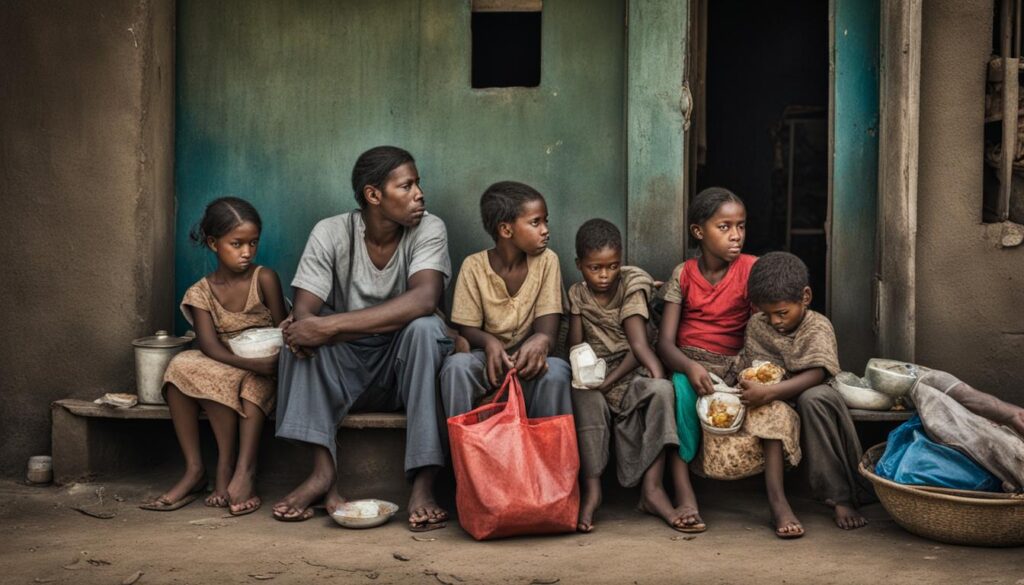Welcome to our insightful article on the impact of poverty stereotypes on individuals and society. In our modern world, societal judgments and stereotypes about poverty have far-reaching consequences, influencing not only our perceptions but also the financial well-being of those affected. These stigmas perpetuate harmful biases and shape the way we think and talk about money.
Key Takeaways:
- Poverty stigma and stereotypes have a significant impact on individuals’ financial well-being.
- Societal judgments about poverty shape the way we think and talk about money.
- Breaking the cycle of poverty requires combatting poverty stigma and promoting compassion and respect.
- Reducing institutional barriers is crucial for creating a more equitable future for all individuals.
- Creating awareness and understanding of poverty stigma can help foster change.
Understanding Poverty Stigma
Poverty stigma refers to the negative attitudes, stereotypes, and judgments associated with individuals living in poverty. These stigmas are deeply ingrained in society and can have detrimental effects on the lives of those affected. Understanding the origins of poverty stigma is crucial in combating its harmful consequences and promoting social equality.
One major factor in the perpetuation of poverty stigma is class stigma. Society often assigns value and worth based on an individual’s socio-economic status, leading to the marginalization of those in lower income brackets. These negative perceptions make it difficult for individuals to overcome the barriers that poverty presents and create a cycle of discrimination that reinforces inequality.
The harmful effects of poverty stigma can be far-reaching, particularly in terms of access to educational opportunities. Stigmatized individuals often face additional challenges when pursuing higher education, including biased treatment, limited resources, and reduced opportunities for advancement. This perpetuates the cycle of poverty by hindering social mobility and limiting individuals’ prospects for a better future.
“Poverty is not a character flaw, but a complex issue with deep-rooted structural causes. Stigmatizing poverty only serves to further entrench inequality and hinder progress towards a more equitable society.” – Dr. Jane Thompson, Sociologist
Efforts to combat poverty stigma must address the underlying biases and misconceptions that perpetuate these negative attitudes. By promoting empathy, compassion, and respect for individuals from low-income backgrounds, we can create a more inclusive and supportive society. Additionally, addressing the institutional barriers that contribute to poverty stigma is essential in ensuring equal access to opportunities for all.
Breaking poverty stigma is not only crucial for the individuals directly affected but also for the well-being of society as a whole. By challenging stereotypes and providing equal educational opportunities, we can empower individuals to break free from the cycle of poverty and create a brighter future for themselves and their communities.
The Reality of Living in Poverty
When it comes to poverty, the experiences of individuals living in these circumstances are often overlooked or misunderstood. Understanding the reality of living in poverty is crucial for developing a comprehensive understanding of the challenges faced by those in this marginalized community. In this section, we will delve into the lived experiences of individuals living in poverty, shedding light on the daily pressures and obstacles they encounter.
Impact on Decision-Making
Living in poverty brings with it a unique set of challenges that affect decision-making processes. Financial constraints and limited resources force individuals to make difficult choices every day. Basic essentials like food, healthcare, and shelter become priorities, leaving little room for long-term planning or investing in personal development.
The additional pressure to conform to societal expectations exacerbates decision-making difficulties for those in poverty. The stigma associated with their circumstances can lead to feelings of shame and inadequacy, making it even harder to make decisions that align with their long-term goals. The fear of judgment from others can override personal aspirations, further perpetuating socioeconomic limitations.
The Daily Pressures and Challenges
Living in poverty means facing a multitude of daily pressures and challenges that are often invisible to the outside world. The constant struggle to make ends meet, the stress of not knowing where the next meal will come from, and the sense of insecurity are just a few examples of the hardships faced by individuals in poverty.
Furthermore, poverty often intersects with other societal issues, such as limited access to quality education and healthcare. This creates a cycle of disadvantage that is difficult to break free from. The lack of opportunities and resources further compound the challenges faced by individuals and families, making it even harder to escape the cycle of poverty.

Living in poverty introduces individuals to a world where every decision is weighed against their limited means and the pressure to conform to societal expectations. The burden of poverty weighs heavily, shaping not only their present circumstances but also their future prospects.
By understanding and empathizing with the realities of living in poverty, we can begin to address the systemic issues that perpetuate these challenges. It is crucial to recognize the additional pressure, stigma, and barriers faced by individuals in poverty and work towards creating a more inclusive and equitable society for all.
Combatting Poverty Stigma
Reducing stigma and promoting compassion and respect for individuals from low-income backgrounds is crucial for fostering a more inclusive society. In order to address poverty stigma effectively, it is essential to identify and address the institutional barriers that perpetuate these harmful stereotypes and hinder social and economic mobility.
One strategy for combating poverty stigma is through education and awareness. By increasing public understanding of the complexities and realities of poverty, we can challenge the misconceptions and stereotypes that contribute to stigmatization. Educational initiatives, such as workshops and campaigns, can provide factual information and personal stories that humanize individuals living in poverty.
Another approach is the promotion of empathy and compassion. Encouraging empathy helps to break down the barriers between people from different socio-economic backgrounds and fosters a greater sense of understanding and connectedness. By encouraging individuals to put themselves in the shoes of those experiencing poverty, we can reduce judgment and stigma.
“Compassion is not a relationship between the healer and the wounded. It’s a relationship between equals. Only when we know our own darkness well can we be present with the darkness of others. Compassion becomes real when we recognize our shared humanity.” – Pema Chödrön
Furthermore, addressing institutional barriers is crucial in combating poverty stigma. These barriers can take various forms, such as discriminatory policies, limited access to resources, and lack of representation. By advocating for policy changes and challenging discriminatory practices, we can create a more equitable system that supports individuals from low-income backgrounds.
| Strategies to Combat Poverty Stigma | Description |
|---|---|
| Educational initiatives | Workshops, campaigns, and programs that provide factual information and personal stories to challenge misconceptions and stereotypes. |
| Empathy promotion | Encouraging individuals to cultivate empathy and understanding towards those experiencing poverty, breaking down barriers and reducing judgment. |
| Addressing institutional barriers | Advocating for policy changes, equal access to resources, and representation to create a more equitable system. |
Combatting poverty stigma requires collective effort and a shift in societal attitudes. By reducing stigma, promoting compassion and respect, and dismantling institutional barriers, we can create a more inclusive society that supports the well-being and success of individuals from all socio-economic backgrounds.

Conclusion
Breaking the cycle of poverty is a crucial endeavor for individuals and society as a whole. The impact of poverty stigma on the financial well-being and social mobility of individuals cannot be underestimated. Stereotypes and judgments about poverty perpetuate a cycle of disadvantage, limiting opportunities for those already facing challenging circumstances.
However, it is vital that we recognize the potential future prospects for individuals from low-income backgrounds. By combating poverty stigma and promoting compassion and respect, we can create a more equitable society where everyone has a fair chance to succeed.
To achieve these goals, it is crucial to address the institutional barriers that hinder social and economic mobility. Access to quality education, healthcare, and job opportunities are essential in breaking the cycle of poverty. By providing support, resources, and advocating for policy changes that promote equality, we can pave the way for a brighter future for all individuals, regardless of their socio-economic background.
By focusing on breaking the cycle of poverty and providing individuals with the necessary tools and support, we can empower them to overcome adversity and create a better life. It is our collective responsibility to challenge poverty stigmas, promote understanding, and work towards a society where every individual has the opportunity to thrive.
– What Effect Do Poverty Stereotypes Have on Emotional Well-being and Happiness?
The misconceptions about poverty and the chasing happiness and money relationship perpetuate negative stereotypes, affecting emotional well-being. These stereotypes create a stigma that can lead to feelings of shame and inadequacy, making it harder for those in poverty to access help and support. This can severely impact their overall happiness and well-being.
How Do Poverty Stereotypes Affect One’s Money Mindset?
Poverty stereotypes can heavily influence a person’s money mindset. The stigma surrounding poverty mindset may lead to self-limiting beliefs and a lack of confidence in pursuing financial goals. Conversely, perpetuating wealth mindset stereotypes can create unrealistic expectations and pressure to live up to societal standards.
FAQ
What is poverty stigma?
Poverty stigma refers to the negative stereotypes and societal judgments that are associated with individuals living in poverty. It includes the labeling, shaming, and stigmatization of people based on their financial situation.
How does poverty stigma impact individuals from low-income backgrounds?
Poverty stigma can have detrimental effects on individuals from low-income backgrounds. It can hinder social mobility by limiting access to educational opportunities and job prospects. It also adds additional pressure and stress, as individuals may feel the need to conform to societal expectations and judgments.
What are the challenges faced by individuals living in poverty?
Individuals living in poverty face numerous challenges on a daily basis. These challenges include limited access to basic necessities, financial insecurity, and inadequate healthcare. They may also face discrimination and exclusion from mainstream society due to poverty stigma.
How can we combat poverty stigma?
Combatting poverty stigma requires a multi-faceted approach. It involves raising awareness about the harmful effects of stigma, promoting compassion and respect for individuals from low-income backgrounds, and challenging the stereotypes and judgments associated with poverty. Addressing institutional barriers that perpetuate poverty and hinder social and economic mobility is also crucial.
Why is it important to break the cycle of poverty?
Breaking the cycle of poverty is essential for creating a more equitable future for all individuals, regardless of their socio-economic background. It allows for equal opportunities and access to resources, promotes social and economic mobility, and fosters a more inclusive and compassionate society.

